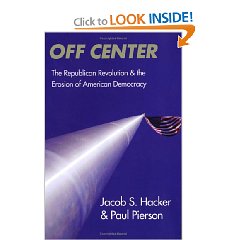
Paul Pierson and Jacob S. Hacker
5.0 out of 5 stars Political Economy
January 17, 2011
Retired Reader (New Mexico) – See all my reviews
This book is an effort by two political scientist to explain how in the last thirty years or so wealth in the U.S. has become concentrated in the hands of a smaller and smaller number of people. The fact that this has occurred is indisputable. So is the fact that the gap between the richest Americans and everybody else has grown exponentially just as the U.S. middle class is gradually disappearing. The explanation of why this has occurred offered by Hacker and Pierson is rather more controversial.
They begin by noting that over the last thirty years not only have the already rich gotten much richer, but that the U.S. National Economy has been transformed into a system that no longer serves the interests of the once broad and thriving American Middle Class that once was the backbone of that economy. In their view the system now serves the interests of a small minority of the rich and very rich (one to five per cent of the population). So their book begins by asking how and why did this occur and why over the last thirty years?
Since Hacker and Pierson are political scientists not economists, they argue that this transformation was due to political, not economic factors. Using what appears to be accurate statistical data they cite three `clues' or factors that point to what happened to the U.S. economy: 1) hyper-concentration of wealth; 2) sustained hyper-concentration; and 3) during the thirty years under study, while wealth concentrated at the very top of the income scale, the economy essentially stopped working for the middle and working classes who continually lost ground during this period.
This economic transformation in favor of the rich they argue is not the result of impersonal economic forces but of deliberate government actions or at times inaction (drift). Their central thesis is that mostly incremental government policies over the last thirty years have had the cumulative effect of changing the U.S. economic system into a `winner take all' system heavily biased in favor of the rich and very rich. At the same time federal government policies undermined the traditionally strong labor unions that served as a counter weight to corporations' power and systematically deregulated financial markets and executive compensation.
Continue reading “Review (Guest): Winner-Take-All Politics–How Washington Made the Rich Richer – and Turned its Back on the Middle Class”



